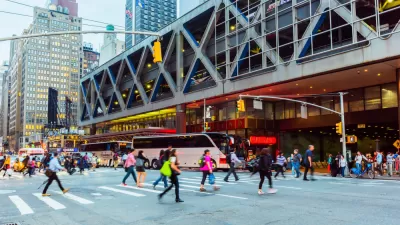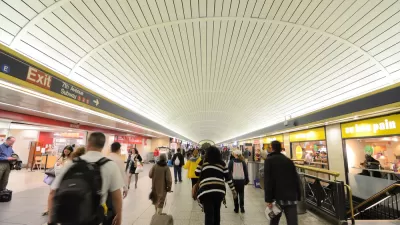The Port Authority bus terminal, located in Midtown, has been "stagnating as ridership has been rising" since the 1970s. Now a third of New Jersey commuters use the facility.
"The problems begin as soon as you walk in," writes Jim O'Grady. "There's no arrivals or departures boards for the buses. The information booth looks abandoned, and the signage is sparse and bewildering. There are mystery leaks, cell phone dead zones and harsh lighting."
"Rich Barone, transportation director of the Regional Plan Association Barone says the terminal is overtaxed with 7,500 buses competing each weekday for not enough gates. So the buses circle, clogging the streets while spewing pollution. And it's going to get worse: with the cancellation of the ARC Tunnel, which would have doubled train capacity under the Hudson River, the main way to get more commuters between New Jersey and Manhattan is by bus."
O'Grady's coverage also includes a few, more colorful, descriptions of the terminal, as well as the Governor Christie connection to the scuttled plans for a larger terminal. Also, the Port Authority is working on a master plan for the future of the terminal, due out this fall.
FULL STORY: The Port Authority Bus Terminal: "If Hell Had a Hell"

Trump Administration Could Effectively End Housing Voucher Program
Federal officials are eyeing major cuts to the Section 8 program that helps millions of low-income households pay rent.

Planetizen Federal Action Tracker
A weekly monitor of how Trump’s orders and actions are impacting planners and planning in America.

Ken Jennings Launches Transit Web Series
The Jeopardy champ wants you to ride public transit.

Rebuilding Smarter: How LA County Is Guiding Fire-Ravaged Communities Toward Resilience
Los Angeles County is leading a coordinated effort to help fire-impacted communities rebuild with resilience by providing recovery resources, promoting fire-wise design, and aligning reconstruction with broader sustainability and climate goals.

When Borders Blur: Regional Collaboration in Action
As regional challenges outgrow city boundaries, “When Borders Blur” explores how cross-jurisdictional collaboration can drive smarter, more resilient urban planning, sharing real-world lessons from thriving partnerships across North America.

Philadelphia Is Expanding its Network of Roundabouts
Roundabouts are widely shown to decrease traffic speed, reduce congestion, and improve efficiency.
Urban Design for Planners 1: Software Tools
This six-course series explores essential urban design concepts using open source software and equips planners with the tools they need to participate fully in the urban design process.
Planning for Universal Design
Learn the tools for implementing Universal Design in planning regulations.
Ada County Highway District
Clanton & Associates, Inc.
Jessamine County Fiscal Court
Institute for Housing and Urban Development Studies (IHS)
City of Grandview
Harvard GSD Executive Education
Toledo-Lucas County Plan Commissions
Salt Lake City
NYU Wagner Graduate School of Public Service





























